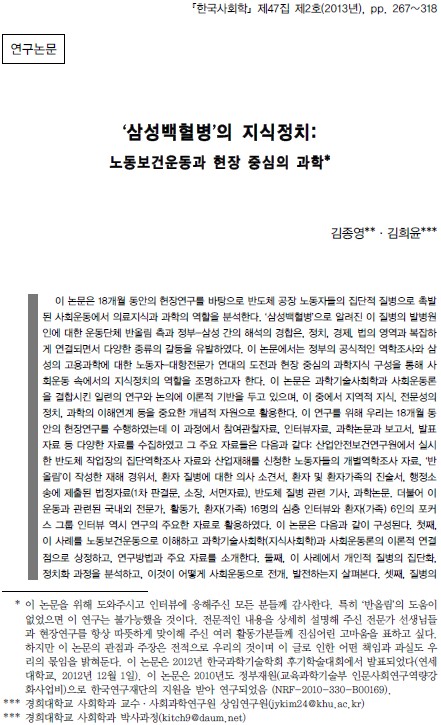
| Title |
: Knowledge Politics in the ‘Samsung Leukemia Case’: A Labor Health Movement and Site-Centered Science |
| Date |
: 2013. 3. |
| Journal title |
: Korean Journal of Sociology |
| Author |
: Jongyoung Kim, Heeyun Kim |
| Contact us |
: csts@khu.ac.kr |
| Abstract |
: Based upon 18 months of fieldwork, this paper analyzes the roles of science and medical knowledge in a labor health movement responding to workersʼ illnesses in semi-conductor factories. The disease, known as ʻSamsung Leukemia,ʼ led to a series of scientific and political conflicts among activist patients, the Korean government, and corporations. This paper especially focuses on a form of knowledge politics in which movement organization builds up site-centered science opposing the governmentʼs official epidemiological studies and Samsungʼs hired science. Theoretically, this paper is based on concepts and arguments developed by combining the sociology of science and technology with social movement studies. In particular, we rely on such illuminating concepts as local knowledge, the politics of expertise, and the interest-ladenness of science. For this study, we conducted fieldwork for 18 months. Our data include various sources such as interviews, participant observations, scientific papers and reports, presentation materials, and news media. We conducted 16 in-depth interviews with activists, experts, and patients as well as a focus group interview with 6 patients (or patientsʼ families). This paper is composed of the following contents. First, we understand this movement as a labor health movement and introduce theoretical background, research methods, and core data. Second, we describe how workersʼ individual diseases were politicized and developed into a social movement. Third, we analyze the constructions and contestations of illness among the movement organization, the Korean government, and Samsung. As these parties sought to prove or disprove causal linkage between workersʼ illness and their factory environment, controversies centered on three issues: the presence of toxic chemicals, the degree of workersʼ exposure, and scientific acceptance of the disease. In this process, the government conducted official epidemiology studies and Samsung hired a scientific consultant company, while oppositional experts refuted those studies and attempted to mobilize scientific knowledge to support patients. Fourth, we show how patients and oppositional experts criticized the governmentʼs and Samsungʼs management-centered science. In the discussion section, we argue that while this labor health movement is class-centered, it also has universal appeal and radical character in that it conveys universal human sufferings and allows for solidarities with other groups. In this sense, it can act as a critical leverage for social change. Ultimately, we understand this groupʼs site-centered science as a combination of patientsʼ ʻdesperate scienceʼ and oppositional expertsʼ ʻthoughtful scienceʼ confronting an implicit alliance among power, capital, and official science. In conclusion, we criticize the political dangers of positivistic science trapped in objectivity and neutrality and argue that science should be reconstructed to emphasize its public nature.
Click the following link for downloading the article: http://www.dbpia.co.kr/Article/3155430 |
|

